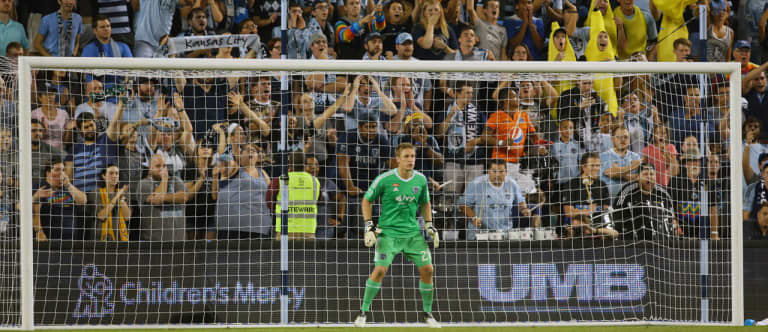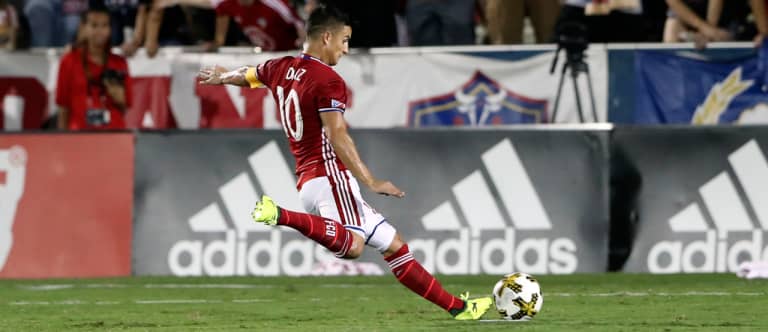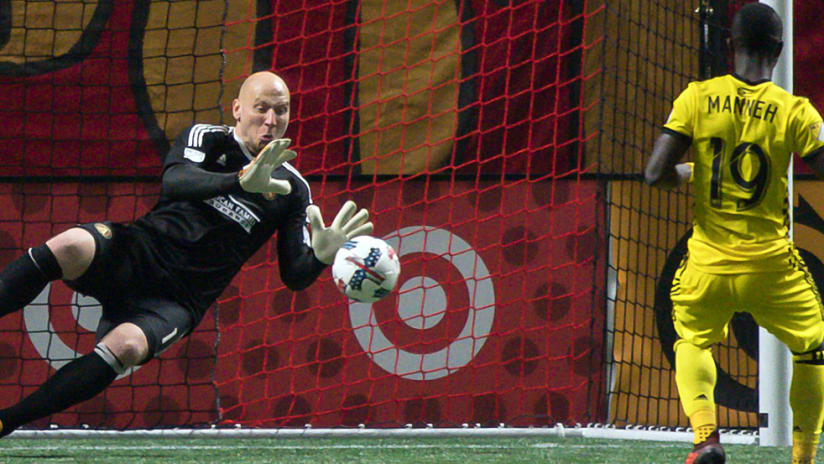The goalkeeper looks huge.
I don’t mean it in any metaphorical sense. I mean when you are standing 12 yards away, the 'keeper looks like a large person. From midfield or 20 yards out, not so much.
Perhaps I had never really stared hard enough at a goalkeeper before. But when it’s your turn to hit a penalty kick and you have to look at him, you realize he’s big. And he looks like he’s taking up an inordinate amount of the goal.
As a fan, it’s easy to think a penalty kick should be pretty simple. I always certainly did. I used to get ticked off at teammates when they missed a penalty. Then you step up to that spot yourself and you realize you have a monster in front of you. It’s like when you get to the end of a video game level and you exhale because you think you did the hard work, and then the giant blue avatar pops out and stands in front of the door. You forget why you got excited in the first place.
What you had always thought seemed a formality now all of a sudden doesn’t look like such a gimme.
Doing the calculations
A goal is 24 feet wide in between the posts, and a goalkeeper's wingspan will generally be about six feet wide. With the 'keeper in the middle of the goal, that leaves nine feet on either side of him.
Nine feet may sound like a lot, but it’s three strides. And any decent goalie will step off his line while you wait for the whistle. When you glance up at him, he will extend his hands as wide and high as possible. You notice that he reaches the crossbar awfully easily. What used to be nine feet on either side of him has just become less since he took that step forward. He’ll have to back up, of course, but the point has been made.
It’s not to say a professional soccer player shouldn’t be able to hit a shot within that three-step-wide range, but it’s certainly an emotional jar when you lift your head after placing the ball on the painted circle (not to mention the weight of the crowd and everyone watching on TV and social media).

If you ask a pro player to pass a ball with pace into a one-foot slot, he or she could do it 9/10 times; but when you ask that same person to hit the side netting of a goal with a 'keeper in in goal and people watching, all of a sudden it becomes an entirely different task. It’s the same action, yet completely different. I wish I could tell you why, but it would probably take a three-hundred page book spanning multiple sciences to even get started.
It all creates an interesting question: Is it worth it to practice penalty kicks?
To practice PKs or not?
Tata Martino recently declared after his Atlanta United lost to Crew SC on penalties that he didn’t think much of rehearsing penalties during practice. “In training it’s really tough to recreate those situations, of pressure situations in games,” he said. Most teams, however, do practice them when an appropriate time comes.
There are several variations on how teams can practice penalty kicks. Some coaches leave it to players to get repetitions after practice. When it’s free time after training, the coach will tell players they can head to a goal and practice penalties.
Most teams have a person or two throughout the season who will rehearse regularly, taking a few reps a couple of times per week, but come playoff time more players will join.
Penalties are mostly a mental battle with yourself – seeing the unexpected monster in front of you and being able to stay focused and confident. As such, some believe it’s better to leave players to themselves, to get lost in their own thoughts and feel the isolation.
But other teams do practice them as a unit. The coach will designate two groups of five players and they will go one by one as in a shootout. Most managers have the rest of the team stay at the top of the 18, but some coaches try to make it as realistic as possible, having players line up in the midfield circle, banning laughter and jokes, and allowing gamesmanship by the other team. It’s difficult, as Martino noted, to replicate the full pressure of the moment, but some teams try to get as close as possible.
One interesting variation on how teams prepare is whether they decide to keep a goalkeeper in net. That all depends on your penalty-kick strategy.
The art of the penalty kick
There are two general schools of thought on the best way to take a penalty: The first, and more complicated (though I suppose it depends on who you are), is to read the goalkeeper as you approach the ball.
Some players approach the ball slowly and wait for the goalkeeper to make a move. When the 'keeper shows he is leaning one way – or, perhaps for the very best attackers, the shooter sends the goalkeeper one way with a subtle movement of the hips or eyes – the shooter calmly rolls it to the other side. When done well, it’s inspiring to watch. When done poorly, it gets mocked across the globe.
The second option involves the choice we typically see executed: Pick a spot and go for it. Regardless of what the goalkeeper does, I know I’m going low and to the right. As such, since the goalkeeper's actions don't influence this approach, there really is no reason to have the 'keeper in goal during training.
In this case the goalkeeper would only distract from the point. The shooter needs to remember “if I hit my spot, I will score.” So all of the shooter’s reps follow that same mindset, and the only aim is to build the muscle memory for the specific action.

There’s one minor problem with “play my own game” philosophy: Goalkeepers in 2017 are usually athletic freaks. They can get to almost any part of the goal in a single bound. If they guess the correct side, and time their jump properly, they can cover almost any part of the goal. Consequently, it’s no longer valid to say you can pick your spot and score. The situation becomes much more complicated.
But if you want to stick to the idea that you can simply pick your spot, you are picking a pretty small spot with a smaller chance of successfully hitting it. And so the shooter then needs to add a personal twist to the matchup in an attempt to gain the upper hand: a stutter step.
If the goalkeeper doesn’t know exactly when you will arrive at the ball, it becomes impossible to time the bound. In that scenario, a player stutters once or twice to mess with the 'keeper's timing, then hits the spot. Stutter steps often look like a show of mockery or flair, but they can have their purpose.
You might then think that it’s a no-brainer to rehearse penalties and that only a stupido would not. But as you can see above, there are a lot of calculations that go into a spot kick.
The moment of truth
At the same time, perhaps none of it matters when a human has to stand in front of 60,000 screaming fans.
Perhaps no amount of rehearsal can outweigh the impact of seeing the emotion on the fans’ faces behind the goal.
Perhaps there’s no way to legitimately train muscle memory for the emotion of the situation.
Perhaps everything I’ve said is overthinking it and it’s best to tell the shooter to go kick it in the big swatch of open net.
Perhaps the only thing that matters is confidence.
Perhaps if you train, one of your five kickers would miss the last one in training and then step up to the real thing with doubt in his mind.
Perhaps if you train, one of your disgruntled teammates would tell one of his friends on the other team where the shooters prefer to go.
So many variables. Yet no one has the perfect prescription.
I would prefer my team practice penalties, but only because I’m a “go down swinging” kinda guy. I can’t sleep at night unless I feel I’m prepared for everything. We always like to think practice gets us closer to perfect, right?
But sometimes situations involve more nuance than that. If Atlanta had won, we probably would all be admiring how Tata is so much more zen than most American or Canadian coaches.
Beyond my own personal emotional defense mechanism, I don’t have an airtight reason to practice penalties. It’s a complicated moment, and every coach and player will ultimately make their own decision as to what suits them best, including not practicing them at all.
But I'd suggest that for just one time you take a friend to a goal. Ask him or her to stand between the pipes while you line up from 12 yards away. Take a moment to soak in what you see.
Bobby Warshaw is a former professional player who played in MLS (2011-2013) and in Scandinavia after an accomplished college career at Stanford. A columnist and podcast host for Howler magazine, Warshaw is a published author and has also appeared on ExtraTime Live and ExtraTime Radio.














